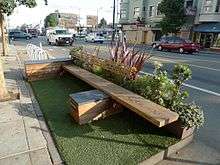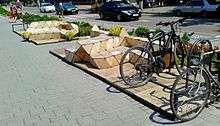Parklet

A parklet is a sidewalk extension that provides more space and amenities for people using the street. Usually parklets are installed on parking lanes and use several parking spaces. Parklets typically extend out from the sidewalk at the level of the sidewalk to the width of the adjacent parking space.[1][2]
Parklets are intended for people. Parklets offer a place to stop, to sit, and to rest while taking in the activities of the street. In instances where a parklet is not intended to accommodate people, it may provide greenery, art, or some other visual amenity. A parklet may accommodate bicycle parking within it, or bicycle parking may be associated with it.[2]
A parklet may be thought of as permanent, but must be designed for quick and easy removal for emergencies or other reasons such as snow removal without damage to the curb or street. As initially conceived, a parklet is always open to the public.[3] However, some cities have allowed restaurants to create parklets that are not open to the public such as Long Beach, California, Fargo, North Dakota and Montreal, Quebec.[4][5]
History
San Francisco has been credited with introducing the first parklet.[6] Since then, parklets have been introduced in cities such as Ames, Iowa[6] and Puebla de Zaragoza, Mexico.[7]
The world’s first formal public parklets were initially conceived by Italian/Brazilian designer and London resident Suzi Bolognese (Sb Design Studio) and installed in San Francisco in 2010.[8]
In August 2012, the School of Architecture at University of Southern California published a graduate thesis "Experimenting with the Margin: Parklets and Plazas as Catalysts in Community and Government," which provided a comprehensive history of the creation of parklet and plaza programs in four California cities.[2] In September 2012, the UCLA Luskin School of Public Affairs published a report, "Reclaiming the Right-of-Way: A toolkit for Creating and Implementing Parklets", examining case studies for parklets in seven cities across North America.[9] In February 2013, The San Francisco Planning Department published a Parklet Manual[1] which serves as a comprehensive overview of the goals, policies, process, procedures and guidelines for creating a parklet in San Francisco. The Manual also serves as a resource for those outside of San Francisco working to establish parklet programs in their own cities.
Design and purpose

Parklets are designed to provide a public place for passersby to relax and enjoy the atmosphere of the city around them, in places where either current urban parks are lacking or where the existing sidewalk width is not large enough to accommodate vibrant street life activities. Parklets can be designed to be either permanent fixtures, or can be designed to be temporary/seasonal in places where snow removal is a concern. Seasonal parklets are found in New York City, Philadelphia, and Chicago.[10][11] Many cities choose to install these sites in order to create more public space by creating "places for people to sit, relax and enjoy the city."[12] The Vancouver 2013 Parklet Pilot Program Guide explains parklets purpose and design as "benefit local businesses, residents, and visitors by providing unique public spaces that attract customers and foster community conversation. They can also have additional benefits such as adding more space for people to walk in congested areas. The typical design is a platform that extends the sidewalk and provides amenities like seats, tables, bike racks, and landscaping"[12]
Impact studies
In September 2010, The San Francisco Great Streets Project (then part of the San Francisco Bicycle Coalition) published a study, "Divisadero Trial Parklet Impact Report," on one of the first eight parklets built in San Francisco.[13] This study was followed in January 2012 by a "Parklet Impact Study" analyzing three corridors in San Francisco.[14] From October 2012 to March 2013, Los Angeles research collaborative Parklet Studies worked under the Complete Streets Working Group of Downtown Los Angeles Neighborhood Council to design and implement a one-year study of the Parklets in downtown Los Angeles. The final report was released in March 2013.
Locations
In the United States, San Francisco hosts more parklets than any other City.[15] The first one-day parklet installation was created in 2005 as an unofficial activist project by feeding a parking meter with coins, unrolling grass sod, and placing a potted tree on top.[16] The city's "Pavement to Parks" program was formed to facilitate installation of parklets as longer-term, yet still temporary, fixtures.[2] As of 2011 the program had received over 50 applications from sponsors around the city.[17] In 2011 the Union Square Business Improvement District installed the most ambitious parklet, a 2-block long installation along Powell Street near Union Square, funded by a corporate donation by Audi.[16]
Parklets have sprung up in Phoenix, Philadelphia, Oakland, Los Angeles, San Jose, Dallas, Seattle, San Diego, Vancouver, British Columbia and Morro Bay, CA.[15][18][19][20][21][22][23][24]
Parklets are typically spaces for passive recreation, The first parklets with active recreation were installed in Los Angeles, CA in February 2013. Two sites on Spring Street, in Downtown Los Angeles, each feature two exercise bicycles on site. Upon evaluation, 20% of people surveyed in the sites said they previously used the machines; but only 5% of activity observed recorded use of the machines. Active recreation use of parklets may need some additional motivation to increase use at the exercise machines.[25]
Parklets have also been created in Mexico in Puebla de Zaragoza during the PueblaDesignFest[26][27]
The first Parklet on the street in London has been installed in July 2015.
See also
References
- 1 2 San Francisco Parklet Manual, Version 1.0 (February 2013). San Francisco Planning Department
- 1 2 3 4 Abad Ocubillo, Robin (2012). Experimenting with the Margin: Parklets and Plazas as Catalysts in Community and Government. University of Southern California.
- ↑ "Pavement to Parks". Sfpavementtoparks.sfplanning.org. Retrieved 2013-11-26.
- ↑ City of Long Beach. "Long Beach's Very Own Retro Row is Home to the 1st Parklet in Southern California No. 9 Restaurant Also Participating in the City Pilot Program". City of Long Beach.
- ↑ UCLA Complete Streets Initiative (2012). Reclaiming the Right-of-Way: A Toolkit for Creating and Implementing Parklets (PDF). Los Angeles, CA: UCLA Luskin School of Public Affairs.
- 1 2 Grunewald, Katie (2013-04-26). "Student Society of Landscape Architecture demonstrates parklet". Iowa State Daily. Retrieved 2013-11-26.
- ↑ "Inaugura Puebla Capital y Colegio de Arquitectos el concepto Parklets". Milenio (in Spanish). Retrieved 2014-01-21.
- ↑ http://inhabitat.com/sao-paulo-replaces-parking-spots-with-mini-parklets-for-a-more-pedestrian-friendly-urban-environment/
- ↑ "Complete Streets Initiative Releases Guide to Creating 'Parklets'". UCLA Luskin School of Public Affairs. 6 September 2012. Retrieved 2014-01-21.
- ↑ City of Chicago. "People Spots".
- ↑ Saffron, Inga. "Transforming parking spots to parklets: Philadelphia joins an urban trend".
- 1 2 City of Vancouver, BC. "Parklets: converting street parking spaces to mini plazas".
- ↑ Pratt, Liza (September 2010). Divisadero Trial Parklet Impact Report (PDF). San Francisco Great Streets Project.
- ↑ Pratt, Liza (January 2010). Parklet Impact Study (PDF). San Francisco, CA.
- 1 2 "Global Map of Parklets, Plazas, and Temporary Programs & Projects". San Francisco Pavement to Parks Program.
- 1 2 King, John (13 July 2011). "Parklets offer a place to pause on busy Powell St.". San Francisco Chronicle.
- ↑ Stephens, Josh. "'Parklets' Create Public Space, 120 Square Feet at a Time". California Planning & Development Report. California Planning & Development Report. Retrieved 29 June 2011.
- ↑ Philadelphia Mayor's Office of Transportation and Utilities. "Philadelphia Parklet Program Guidelines" (PDF). Philadelphia MOTU.
- ↑ King, John (29 December 2011). "S.F. parklets: a little tour of a major trend". SFGate. pp. A1. Retrieved 29 December 2011.
a guided tour of every parklet now open. Some are more welcoming than others. Some already show their age. The best strive to create destinations, not just seating. It's a design experiment being conducted before our eyes, and it's not going away.
- ↑ Artz, Matthew (21 March 2012). "'Parking spot to park in Oakland". Oakland Tribune.
- ↑ https://ca-sanjose.civicplus.com/DocumentCenter/View/10686
- ↑ Ray, Cabrera (9 October 2013). "First Street Improvement Project in Pictures". City of Phoenix.
- ↑ Seattle’s first parklet opens today!, Seattle Department of Transportation, 18 September 2013
- ↑ North Park coffee roaster gets San Diego's first parklet, San Diego Reader, 1 September 2014
- ↑ UCLA Complete Streets Initiative & Parklet Studies. "Reclaiming the Right-of-Way: Evaluation Report" (PDF). Lewis Center for Regional Policy Studies. Luskin School of Public Affairs.
- ↑ "Inaugura Ayuntamiento de Puebla y Colegio de Arquitectos el concepto Parklets".
- ↑ "INSTALAN PARKLETS EN PUEBLA". Televisa Regional.
External links
| Wikimedia Commons has media related to Parklets. |
- Pavement to Parks, San Francisco
- Adelaide City Council Parklet Program, South Australia
- People Spots, Chicago, IL
- City of Vancouver, Parklets
- New York City Department of Transportation, Street Seats
- Morro Bay Parklet Pilot Program
- Victoria, British Columbia, Canada — Parklet
- Hackney installs country's first US-inspired on-street micro park